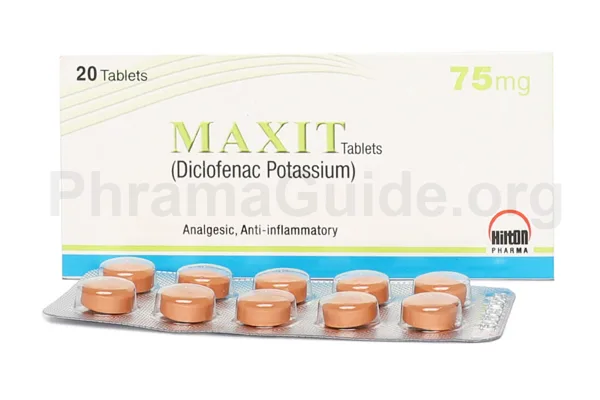Maxit is a nonsteroidal anti-inflammatory drug (NSAID), used primarily for treating fevers and muscle cramps. Like any medication, Maxit can have both common and less common side effects, as well as potential drug interactions.
Common Side Effects
- Stomach upset: Maxit may cause GI side effects, including nausea, heartburn, or stomach pain.
- Dizziness or headache: Some people might experience dizziness or headaches while taking Maxit.
- Rash or itching: Skin reactions like rashes or itching are possible side effects of Maxit.
- Increased blood pressure: Sometimes Maxit can elevate blood pressure.
- Fluid retention: Maxit may cause swelling due to fluid retention in the body, particularly in the legs or arms.
Less Common Side Effects
- Liver problems: Such as abnormal liver function tests or hepatitis (inflammation of the liver).
- Kidney issues: Like kidney damage or changes in urine frequency or color while taking Maxit.
- Cardiovascular effects: This includes an increased risk of heart attack or stroke, particularly if used at high doses or for a prolonged period, especially in individuals with pre-existing cardiovascular conditions.
- Blood disorders: Rarely, Maxit can affect blood cells, leading to anemia, thrombocytopenia (low platelet count), or leukopenia (low white blood cell count).
- Allergic reactions: Some individuals might experience severe allergic reactions associated with Maxit, characterized by hives, swelling, difficulty breathing, or anaphylaxis.
- Nervous system effects: This might involve symptoms like confusion, depression, or ringing in the ears.

What is Maxit?
Maxit is one of the leading brands of Diclofenac Potassium, manufactured and marketed by Hilton Pharmaceuticals (Pvt) Ltd, Pakistan.
Maxit : Available Formulations and Strengths
Presently, Maxit is available in Tablet and injection form with the following strengths.
Maxit Tablets : Diclofenac Potassium 50mg and 75mg strengths.
Maxit-S Injection : Diclofenac Sodium 25mg/ml strength.
Maxit-L Injection : Diclofenac Sodium 75mg/ml + Lignocaine 50mg/ml strengths
What Are The Possible Drug Interactions of Maxit?
- Anticoagulants (blood thinners): Increased risk of bleeding when taking Maxit with drugs like warfarin or other anticoagulants.
- Other NSAIDs and aspirin: Increased risk of stomach bleeding and ulcers when combined Maxit, with other NSAIDs or high doses of aspirin.
- Corticosteroids: Increased risk of gastrointestinal bleeding or ulceration.
- Selective serotonin reuptake inhibitors (SSRIs) and serotonin-norepinephrine reuptake inhibitors (SNRIs): Increased risk of bleeding due to their effect on platelets when taken with Maxit.
- ACE inhibitors and angiotensin receptor blockers (ARBs): Potential reduction in the blood pressure-lowering effects of these medications.
- Lithium and methotrexate: Increased levels of these drugs in the body due to reduced elimination when taken with Maxit.
- Diuretics and certain blood pressure medications: Possible reduction in their effectiveness when combined with Maxit.
- Cyclosporine or tacrolimus: Increased risk of kidney damage when combined with Maxit.

Leave A Comment